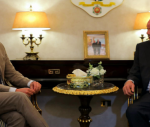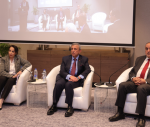You are here
UN peacekeeping must be reformed
Mar 01,2018 - Last updated at Mar 02,2018
The new, vicious fighting in the Congo is the fourth round of warfare since its independence in 1960. No other country has seen so many “blue berets”, UN peacekeeping troops, in its short history. The Belgian colonialists may have exploited the Congo and transferred massive amounts of their wealth back to Belgium, but one leader after another has continued in their steps, making use of the country’s vast mineral deposits to build an edifice of wealth and unilateral power. Leaders have played on tribal fears and insecurity. War has been the outcome.
In the last few years, there has been talk of winding down the large contingent. A kind of peace seemed to have arrived. No longer. There are still 16,000 UN troops there.
The way the UN peacekeepers work has changed a lot since their first deployment soon after independence. Then, the accent was on not using arms. UN soldiers accused of misbehaviour were rare. Today, force, even killing, is widespread by peacekeepers. So are the reports of UN soldiers looting and raping. The idealism and self-discipline of the “blue helmets” are being undermined.
There are reports from Darfur in Sudan, the UN’s second biggest operation, that some NGO workers were accosted, beaten up and some of the women raped not far from a UN encampment. Despite their calls for help, no one appeared. In the Central African Republic, eleven well-trained French peacekeepers were raping at will. Boys between the ages of 9 and 13 were sodomised. Anders Kompass, a former head of field operations at the UN human rights office in Geneva, blew the whistle. In return, he was denounced at the UN and suspended. He was exonerated nine months later. Secretary-General Ban Ki-Moon described the UN’s handling of the allegations as a “gross institutional failure”.
I was in Liberia right at the end of the civil war when the chief peacemaker, President Olusegun Obasanjo of Nigeria, paid a visit. One of his stops was at the headquarters of the Nigerian peacekeepers. He gave the gathering of soldiers a tough speech, warning them that bad behaviour, including the abuse of women, would not be tolerated. He meant it.
Missions in Africa are among the most dangerous for UN troops. Almost 200 peacekeepers have been killed in the last five years. Last year, 56 peacekeepers were killed, the highest ever. These casualties encourage peacekeepers to get tough.
A new UN report commissioned by secretary-general, Antonio Guterres, and submitted in December says, “Unfortunately, hostile forces do not understand any other language than force. To deter and repel attacks and to defeat attackers”, the report reads, “the UN needs to be strong and not fear to use force, when necessary”.
The founders of UN peacekeeping, Secretary-General Dag Hammarskjöld, Ralph Bunche and Brian Urquhart, would not have recognised this language. In their eyes, force begets force and only in extreme cases should serious force be used. UN forces, Indians, Ethiopians, Swedes and British were kept on a tight leash. The Swedes opened a special school in Sweden to train its troops in this highly skilled new art of peacekeeping.
The UN now has 96,000 peacekeepers around the world, far more than the 16,000 soldiers the US has fighting abroad.
Since 2015, there have been 346 accusations of serious misconduct. In one pending case, nineteen soldiers from Gabon are alleged to have raped 67 people, including 36 children, in the Central African Republic. Justice is supposed to be handed out in the suspected offender’s home country. More often than not it is not.
In 1994, the UN appointed Graca Machel, the former first lady of Mozambique, to investigate the effect of armed conflict on children. Her landmark report was one of the first to raise the issue of the sexual exploitation of children and called for an end to impunity for perpetrators. But it was not until 2003 that Secretary-General Kofi Annan introduced a zero tolerance policy on sexual abuse and exploitation, as well as a special mechanism for reporting it. The abuse has not ended. Accused peacekeepers too often have merely been deployed elsewhere or sent home.
Marsha Henry of the London School of Economics, interviewed by Al Jazeera, argued that peacekeeping operations require a different set of values and emotions, such as impartiality and empathy, “attributes that may have been discouraged by traditional military training”.
The UN, if belatedly, is trying to deal with these problems. There is now increased vetting of soldiers before deployment. More female police officers are being recruited. Many countries have training schools for peacekeepers following the Swedish example.
It is not enough. UN soldiers should be rotated home more often so that sexual frustration can be more easily contained. The UN should set up its own court to try suspected offenders.
This year, there is a need for a larger deployment of peacekeepers in the Congo. Can they do better than their predecessors? At the moment, it is difficult to be sure.













